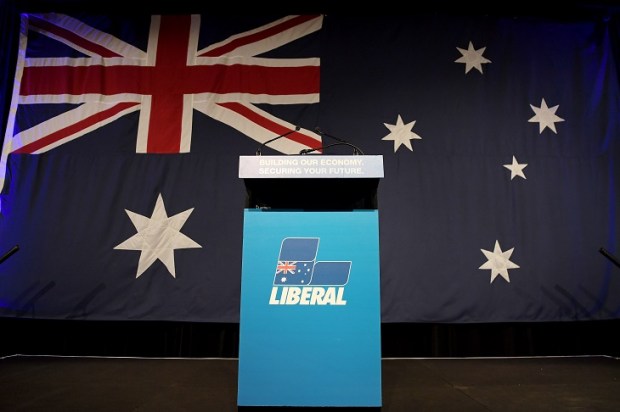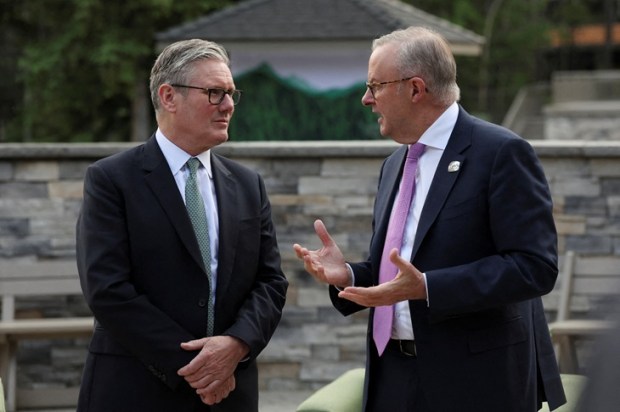Opposition Leader Sussan Ley has realised that the business community is to the Liberals what the unions are to Labor.
The old capitalism vs communism economic argument. It makes sense, on paper, at least.
While it is true that the free market offers the solution to many of Australia’s woes, it is not clear if the moderate modern Liberal Party believes in the market or simply its money.
Without the backing of business, the Liberals have no chance of winning an election. Worse, Albanese’s Labor Party is ahead of the game and has already set the Treasurer, Jim Chalmers, on a mission to erode private enterprise. This means empowering the unions in spaces they are not wanted, collapsing job flexibility, and enticing whatever industry is left onto the public purse via grants and green promises, bringing business into the sphere of government where it can be more easily controlled.
This is a race. Australia is an hourglass that has been tipped over, with the equity of the private sector pouring into the public sector. It is a countdown to inescapable socialism.
There needs to be philosophical preaching from the Liberals on this front. They must bell the cat, loudly and frequently, about the danger government presents to business and urge them to step away from benefits that become chains. Free enterprise really should be free.
In this, small and medium businesses are the most loyal of Liberal Party allies, and yet they are being pushed aside for the glory of the big end of town, much as regional seats have been pushed away in favour of Teal seats which are viewed as jewels in the crown of a party that will never rule again.
The biggest problem with the Sussan Ley listening tour, aside from its addiction to submissive inaction, is that it has become clear the Liberal Party either has no idea why it fell out of bed with business or does not want to acknowledge the reason publicly.
Saying that the business community lost faith while Scott Morrison was Prime Minister explains very little. Why was that the case? Where did Morrison go wrong? Did it have anything to do with shutting down the economy for two years, driving a wedge between employers and employees, all thanks to a massive overreaction to Chinese pandemic propaganda?
The CCP is a political entity, we might add, whose plan since Mao has been to trigger a global revolution against democracy and capitalism in the West. Covid should have been approached with extreme suspicion. As should Albanese’s dream to tie Australia up in the web of CCP trade. Alas, our leaders are unbelievably ignorant to the larger game of geopolitics.
Australia’s small and medium business community is in a state of freefall, dying by degrees. Intergenerational entrepreneurs have exhausted their savings, lost their homes, and been left in financial ruin thanks to the drawn-out false promises of a lying government. Anything they do earn is taxed and given to foreigners. Yes, they are angry.
For these terrible economic crimes, and a lack of leadership against the tyranny of the state governments, the Australian business community fell out of love not only with the Liberal Party, but with taking risks.
Despite hating the Labor Party, many of our former business owners have decided to languish on the public purse and will vote to continue the welfare state until fairness is restored.
For them, the Australian dream has transformed into a financial nightmare akin to the Keating years.
With taxes rising, payroll unreasonably complex, energy doubling in price, and slave-like competition from China, who would go into business and what can Sussan Ley promise them if they do?
It was no accident that a pub owner told Ms Ley, ‘I voted for Pauline Hanson.’ One Nation was promising to lower taxes on alcohol. Easy win.
Small businesses are what grow into medium businesses. They are the breeding pools of economic wealth and new ideas, yet it seems the Opposition’s eye has shifted toward the bigger end of town.
‘It’s important that we listen and engage with businesses of all sizes as they all have a role to play in getting the economy going and increasingly productivity,’ said Ms Ley. ‘Big businesses are, self-evidently, large employers of young professional women.’
Is there some sort of new rule that Ms Ley must shoehorn ‘women’ into every conversation?
‘Equally, it is important that the impact of government decisions can weigh differently on small and family businesses compared to larger businesses. For many small businesses, there is no compliance or HR department and the boardroom table is the kitchen table.’
No kidding. Government has used the tyranny of ‘compliance’ and ‘HR’ to crush small businesses under the weight of regulation they simply cannot satisfy. Even when exempt, it places a ceiling over their growth with many choosing to remain small to avoid the weight of government.
Ms Ley wasted no time leaning toward the big end of town. According to the Australian Financial Review:
Among the businesses leaders Ley has already met are the Commonwealth Bank’s Matt Comyn, Rio Tinto managing director of operational and technical support Stephen Jones, Wesfarmers chief executive Robb Scott, and the Business Council of Australia’s Bran Black and Geoff Culbert. Next week, she is scheduled to meet Westpac boss Anthony Miller, Woodside chief executive Meg O’Neill, Qantas chief executive Vanessa Hudson, Chartered Accountants ANZ boss Ainslie van Onselen and members of the Investor Group on Climate Change.
Climate Change? You can hear the small and medium business community groaning.
The AFR goes on to print, ‘The Liberal Party’s relationship with big business was pushed to the brink last term following numerous hostile exchanges between Dutton and executives over their stance on social policies and issues like the Indigenous Voice to Parliament.’
Which means we are being asked to believe that the wider Australian business community has a beef with the Liberal Party because a few executives were annoyed that their virtue signalling was challenged. This is hard to take seriously, given virtue signalling was already on the decline with big brands dropping their rainbows and their pronouns thanks to widespread public backlash. The result of the referendum would have been enough for any business leader to realise race politics is a dead horse poisoning the bottom line.
Is it plausible a few Woke millionaires are ticked-off by the Voice result? Sure. Is this something for Ms Ley to solve? No. Like the Pacific Islands fabricating tears about non-existent rising sea levels, the big end of town is trying to see what it can extort out of a naïve Liberal Party desperate for votes.
I agree with other commentators that these big companies are more interested in Industry Super Funds than customers, which makes these waters all the more treacherous for Ms Ley.
Attempting to woo Big Business via their super funds is probably the reason the Liberals refuse to give up on the Net Zero lie. Phrases from Ms Ley such as, ‘We also want the Australian business community to understand that we respect them and value what they do,’ are utterly meaningless.
The Nationals, their Coalition partner, is aware that their base is not the big end of town, but rather regional and rural communities, including small and medium businesses in the farming, hospitality, retail, and tourist sector. Australian mum-and-dad companies are what keep these regional centres alive and they are being killed off by Net Zero policies that benefit Big Business in the city.
This puts the Coalition at odds, especially as the Liberals are competing on the same narrative as Labor. No amount of ‘listening’ can solve this. The Liberals need to work out how to gut the power base of Labor and out-compete the Treasurer on items such as tax cuts… Ms Ley should be seeking to make the small and medium business more powerful and much larger, as it used to be during the days of Howard’s battlers.
Let us return to the fundamental problem facing the Australian business community: trust.
Small and medium businesses watched the Morrison government shut their doors for years under the excuse of ‘safety’ while bottle shops, big retailers, and supermarkets were allowed to stay open and absorb the entire market share.
No one with a brain is going to start a business in an environment where the government can wave its magic pandemic wand and close everything down without compensation. You’d have to be mad.
A few legislative reforms and an apology wouldn’t go astray from Ms Ley.

























